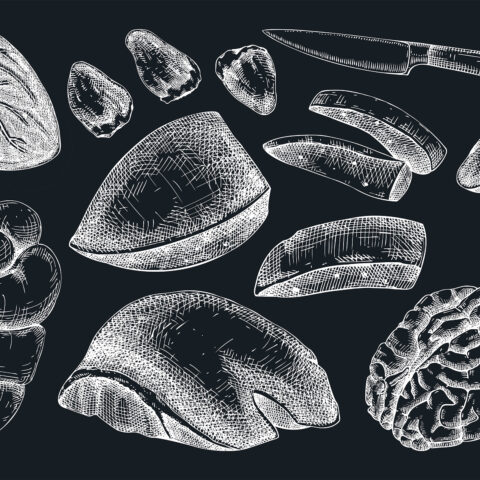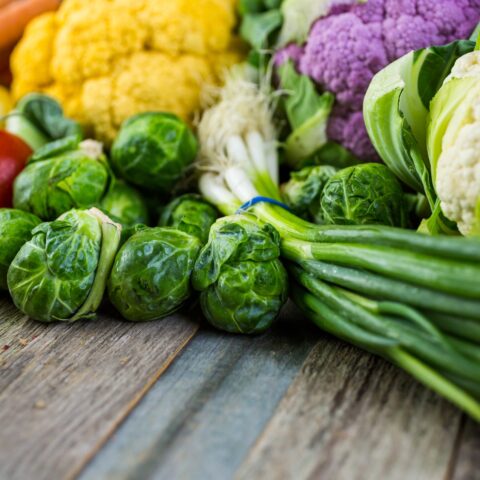7 Functional Coffee Boosters to Try

Many of us are aware that a cup of joe is excellent for waking up the body and mind in the morning. But what if it could do more? Functional coffee boosters have been trending recently as a way to add more nutrients into your everyday brew. We break down which ones are worth it, which ones double as healthy coffee flavorings, and which ones are not recommended as part of The Paleo Diet®.
RELATED: Coffee Cart Accessories to Be an At-Home Barista
Functional Coffee Booster Oils
Butter in coffee, olive oil lattes…there have been several trends involving putting fats and oils into a cup of joe, but which ones are worth trying? We outline the potential health benefits and drawbacks of two coffee booster oils so you can make an informed decision.
Coconut Oil
Butter and ghee (clarified butter) are two ingredients that have become popular to add to hot coffee. There’s limited research on where this idea comes from, but some claim it originated in Ethiopia in the 19th century.
Since butter and ghee are not considered Paleo, coconut oil is a great alternative that can add a subtly sweet and nutty flavor to your morning brew. Just be sure to choose minimally processed varieties such as virgin, extra-virgin, or unrefined.
Health Benefits of Coconut Oil
Consuming coconut oil may significantly suppress hunger levels, according to one study,1 which can support weight loss. Another study showed that consuming coconut oil may enhance levels of HDL-C,2 the “good” cholesterol in the body that can help remove bad cholesterol from arteries and ultimately protect the heart.3
Potential Side Effects of Coconut Oil
Coconut oil has fallen in and out of health trends for containing high levels of saturated fat, which some research has found to have an increased risk of heart disease. However, the primary saturated fat in coconut oil—lauric acid—is a medium chain fatty acid, which is quickly absorbed in the body and does not reaccumulate as fat.4 According to a 2025 analysis of studies on the effect of coconut oil on lipid profiles, researchers could not find justification for avoiding coconut oil.5
Ultimately, even with the potential benefits of coconut oil, balance is key. At The Paleo Diet, we believe that too much of a good thing can become harmful, so it’s important to stay mindful of anything we consume.
Olive Oil
If you’re a Starbucks fan, you probably heard of their Oleato™ line of olive oil-infused coffee drinks when it made waves in the coffee scene from 2023 through 2024.
The drinks paired the smooth, syrupy texture of olive oil with the rich, bold flavor of coffee. Some, including this author, found the combination to be a strange yet beautiful blend of flavors, but you need to be a fan of olive oil as the taste is strong.
Health Benefits of Olive Oil
Olive oil is considered a “superfood” and has been consumed for generations. In 2019, a variety of experts analyzed up-to-date research on olive oil, concluding that “virgin olive oils have anti-atherosclerotic potential, favoring endothelial function and preserving blood pressure, maintaining lipoprotein functionality, exerting anti-inflammatory and antioxidant effects, and modulating gene expression.”6
Another study found moderate consumption of extra-virgin olive oil may have a beneficial influence on breast cancer risk.7
Potential Side Effects of Olive Oil
There is not much research espousing the negative effects of olive oil. One meta-analysis found “the consumption of olive oil does not seem to alter the distribution of body fat, despite a small indication that supplementation in capsules can increase adipose mass.”7 It is important to note that it’s unusual to consume olive oil in capsule form.
Functional Coffee Booster Supplements
The Paleo Diet advocates for getting essential vitamins and minerals from whole foods whenever possible. Nutrient-dense foods typically provide what the body needs without supplementation. However, there are cases where supplements (particularly when they come from natural sources) can add to the diet when used sparingly.
Below, we outline two functional coffee booster supplements, but it’s worth considering these factors before making them part of your daily routine.
Collagen
One big functional coffee booster we’ve seen is collagen. It’s the most abundant protein in the body, helping to build and support skin, muscles, bones, tendons, and other connective tissues.
The body is unable to absorb collagen in its whole form, but you can increase your collagen levels by consuming collagen peptide supplements, which have been broken down into a form that can be absorbed through the intestinal tract. Alternatively, you can also eat foods high in vitamin C, proline, glycine, copper, and zinc to help increase your own body’s collagen production naturally.8
To add collagen to your coffee, stir a scoop of powdered collagen peptides into a hot mug.
Health Benefits of Collagen
Research shows that when collagen peptides are taken orally with other dermonutrients, they can “significantly improve skin hydration, elasticity, roughness, and density after three months of intake.”9 Overall, the test subjects who participated in the experiment concluded that their skin’s overall appearance improved after the three months of taking collagen.
Potential Side Effects of Collagen
The same study found that “the collagen supplement did not cause any side effects and proved to be safe and well tolerated during the entire period of application and thereafter.”9 That being said, always consult with your healthcare provider before taking any new supplement, and monitor your health for any adverse effects.
TRY IT: Shake This Espresso Martini Mocktail with a Scoop of Collagen
L-Theanine
L-theanine is said to be a natural way to help reduce stress and promote mental clarity, which has made it another recently trending functional coffee booster. L-theanine is a non-protein amino acid that’s found abundantly in tea leaves.10 While you can drink tea that contains L-theanine, the easiest way to mix it properly into coffee is to get this amino acid in its powder form.
Health Benefits of L-Theanine
There are promising potential benefits to L-theanine in initial studies, but strong scientific evidence isn’t there yet.10 And while L-theanine cannot treat any conditions, it has been shown to help manage symptoms of certain mental health conditions.
One 2008 study found that L-theanine supported mental clarity by improving attention, processing, and patience when completing challenging tasks.11 Another piece of research concludes that L-theanine can help “reduce psychiatric symptoms more effectively than control conditions in individuals with schizophrenia, anxiety disorders, and ADHD.”12
Potential Side Effects of L-Theanine
The evidence on the side effects of L-theanine is still limited, and more studies are needed since this supplement is relatively new and trending.
It’s important to note that the FDA does not regulate or review dietary supplements. For safety, consider speaking with your healthcare provider before adding them to your daily or weekly routine.
As we said earlier, too much of anything is not good. Be mindful of how much collagen or L-theanine you consume, as you would any food.
Mushroom Powder
Mushrooms have recently come into the spotlight as a longevity food, with Dr. Loren Cordain explaining in his book Paleo for Life: “The available evidence points to a strong association between eating mushrooms and good health as we age, with studies linking mushroom consumption to a lower risk of diabetes, hypertension, heart disease, and cognitive decline.”13
Mushrooms are great at absorbing flavors, but not everyone wants to eat them every day—or even enjoys the texture of fungus. By consuming mushrooms in powdered form, you can still benefit from their health effects. Some people who are sensitive to caffeine make mushroom lattes as an alternative to coffee, but you can still enjoy your daily morning Joe with just a teaspoon of mushroom powder added.
Health Benefits of Mushroom Powder
Some of the nutrients found in mushrooms that contribute to healthy aging include vitamin B6, potassium, selenium, niacin, riboflavin, and essential fatty acids. These support cellular health, cellular energy, and antioxidant production.13 Mushrooms also have their own powerful antioxidants, ergothioneine and glutathione, and they are a good source of the compound ergosterol, which has been found to hold many beneficial effects, from neuroprotection to anticancer applications.14
Potential Side Effects of Mushroom Powder
Some mushrooms are inedible, but you won’t likely find those kinds in your storebought mushroom powder. However, Paleo for Life recommends against eating shiitake mushrooms, as they contain proteins that may block biotin absorption.
Healthy Coffee Flavorings
Cinnamon and honey are the last two functional coffee boosters to address. They are more about enhancing flavor, though they also offer potential health benefits.
Cinnamon
A dash of cinnamon makes a flavorful and fun addition to your coffee, though we recommend mixing about 1 tablespoon into your grounds before brewing to get an enhanced taste without masking the traditional flavor of coffee.
Health Benefits of Cinnamon
There is some evidence that cinnamon can help improve our body’s regulation of glucose and fats,15, 16 but check the label to see which kind you are buying. Ceylon cinnamon is considered the purest and most natural form and will provide the greatest health benefits.
Potential Side Effects of Cinnamon
If you’re unsure of the type of cinnamon in your spice cabinet, it is likely cassia (AKA Saigon) cinnamon. This cheaper version contains higher levels of coumarin that can lead to liver damage and other issues.”17 To avoid the risk of negative health effects, source Ceylon cinnamon when possible.
TRY IT: Top This Paleo-Friendly Pumpkin Spice Latte with Cinnamon
Honey
If you want to ditch your sugary coffee addiction, honey can be a great steppingstone to wean yourself off. Simply stir a little honey (a small amount goes a long way) into hot or iced coffee for a natural sweetener alternative.
Health Benefits of Honey
One study describes honey’s potential benefits as “microbial inhibition, wound healing, and its effects on other diseases.”18 Another study explains “the main beneficial effects have been observed on cardiovascular health in healthy, diabetic, and hyperlipidemic subjects on glucose tolerance in healthy and diabetic subjects, on mucositis in cancer patients, on URTIs in children, and on wound healing.”19
Potential Side Effects of Honey
Although honey is a natural sweetener, it’s still a form of sugar. It’s best to enjoy it in moderation, since excessive intake, like with any high simple-sugar food, can contribute to insulin resistance.
TRY IT: Enjoy an Iced Rosehip-Cardamom Latte with Honey
Use Discretion When Choosing a Coffee Booster
As coffee trends continue to grow and change, people will find more ways to add functional coffee boosters and healthy coffee flavorings to their morning brew. Some will likely be Paleo, while others may not.
As always, take trending advice with a grain of salt, and consult with a healthcare professional before adding supplements to your daily routine. If you are considering adding something to your coffee and want our input, feel free to email us at help@thepaleodiet.com to learn more.
References
- Metin, Z. E., Bilgic, P., Tengilimoğlu Metin, M. M., & Akkoca, M. (2022). Comparing acute effects of extra virgin coconut oil and extra virgin olive oil consumption on appetite and food intake in normal-weight and obese male subjects. PLOS ONE, 17(9), e0274663. https://pmc.ncbi.nlm.nih.gov/articles/PMC9480981/
- Feranil, A. B., Duazo, P. L., Kuzawa, C. W., & Adair, L. S. (2017). Coconut oil predicts a beneficial lipid profile in pre-menopausal women in the Philippines. Asia Pacific Journal of Clinical Nutrition, 20(2), 190. https://pmc.ncbi.nlm.nih.gov/articles/PMC3146349/
- American Heart Association. (2024, February 19). HDL (good), LDL (bad) cholesterol and triglycerides. American Heart Association. https://www.heart.org/en/health-topics/cholesterol/hdl-good-ldl-bad-cholesterol-and-triglycerides
- Jadhav, H. B., & Annapure, U. S. (2022). Triglycerides of medium-chain Fatty acids: a Concise Review. Journal of Food Science and Technology, 60(8). https://pmc.ncbi.nlm.nih.gov/articles/PMC9217113
- Newport, M. T., & Dayrit, F. M. (2025). Analysis of 26 Studies of the Impact of Coconut Oil on Lipid Parameters: Beyond Total and LDL Cholesterol. Nutrients, 17(3), 514. https://pmc.ncbi.nlm.nih.gov/articles/PMC11819987/
- Gaforio, Visioli, Alarcón-de-la-Lastra, Castañer, Delgado-Rodríguez, Fitó, Hernández, Huertas, Martínez-González, Menendez, Osada, Papadaki, Parrón, Pereira, Rosillo, Sánchez-Quesada, Schwingshackl, Toledo, & Tsatsakis. (2019). Virgin Olive Oil and Health: Summary of the III International Conference on Virgin Olive Oil and Health Consensus Report, JAEN (Spain) 2018. Nutrients, 11(9), 2039. https://pmc.ncbi.nlm.nih.gov/articles/PMC6770785/
- Escrich, E., Moral, R., & Solanas, M. (n.d.). Public Health Nutrition: 14(12A). https://pubmed.ncbi.nlm.nih.gov/22166191/
- Cleveland Clinic. (2022). Collagen: What It is, Types, Function & Benefits. Cleveland Clinic. https://my.clevelandclinic.org/health/articles/23089-collagen
- Bolke, L., Schlippe, G., Gerß, J., & Voss, W. (2019). A Collagen Supplement Improves Skin Hydration, Elasticity, Roughness, and Density: Results of a Randomized, Placebo-Controlled, Blind Study. Nutrients, 11(10), 2494. https://doi.org/10.3390/nu11102494
- Dashwood, R., & Visioli, F. (2025). l-theanine: From tea leaf to trending supplement – does the science match the hype for brain health and relaxation? Nutrition Research, 134, 39–48. https://www.sciencedirect.com/science/article/pii/S0271531724001684
- Gomez-Ramirez, M., Kelly, S. P., Montesi, J. L., & Foxe, J. J. (2009). The effects of L-theanine on alpha-band oscillatory brain activity during a visuo-spatial attention task. Brain Topography, 22(1), 44–51. https://link.springer.com/article/10.1007/s10548-008-0068-z
- Moshfeghinia, R., Sanaei, E., Mostafavi, S., Assadian, K., Sanaei, A., & Ayano, G. (2024). The effects of L-theanine supplementation on the outcomes of patients with mental disorders: a systematic review. BMC Psychiatry, 24(1). https://pmc.ncbi.nlm.nih.gov/articles/PMC11616108/
- Cordain, L., Connor, T., & Smith, M. J. (2025). Paleo for Life. Simon and Schuster.
- Panthakarn Rangsinth, Rajasekharan Sharika, Nattaporn Pattarachotanant, Chatrawee Duangjan, Chamaiphron Wongwan, Chanin Sillapachaiyaporn, Sunita Nilkhet, Nichaporn Wongsirojkul, Anchalee Prasansuklab, Tewin Tencomnao, George P.H. Leung, & Siriporn Chuchawankul. (2023). Potential Beneficial Effects and Pharmacological Properties of Ergosterol, a Common Bioactive Compound in Edible Mushrooms. Foods, 12(13), 2529–2529. https://www.mdpi.com/2304-8158/12/13/2529
- Ranasinghe, P., Galappaththy, P., Constantine, G. R., Jayawardena, R., Weeratunga, H. D., Premakumara, S., & Katulanda, P. (2017). Cinnamomum zeylanicum (Ceylon cinnamon) as a potential pharmaceutical agent for type-2 diabetes mellitus: study protocol for a randomized controlled trial. Trials, 18(1). https://pubmed.ncbi.nlm.nih.gov/28962661/
- Silva, M. L., Bernardo, M. A., Singh, J., & de Mesquita, M. F. (2022). Cinnamon as a Complementary Therapeutic Approach for Dysglycemia and Dyslipidemia Control in Type 2 Diabetes Mellitus and Its Molecular Mechanism of Action: A Review. Nutrients, 14(13), 2773. https://pubmed.ncbi.nlm.nih.gov/35807953/
- Casley-Smith, J. R., & Casley-Smith, J. R. (1995). Frequency of coumarin hepatotoxicity. The Medical Journal of Australia, 162(7), 391. https://pubmed.ncbi.nlm.nih.gov/7715532/
- Pasupuleti, V. R., Sammugam, L., Ramesh, N., & Gan, S. H. (2017). Honey, Propolis, and Royal Jelly: A Comprehensive Review of Their Biological Actions and Health Benefits. Oxidative Medicine and Cellular Longevity, 2017, 1–21. https://pubmed.ncbi.nlm.nih.gov/28814983/
- Palma-Morales, M., Huertas, J. R., & Rodríguez-Pérez, C. (2023). A Comprehensive Review of the Effect of Honey on Human Health. A Comprehensive Review of the Effect of Honey on Human Health, 15(13), 3056–3056. https://pmc.ncbi.nlm.nih.gov/articles/PMC10346535/
Isabella Mead
Isabella Mead has experience in creating digital content for lifestyle and nutrition brands.
More About The Author




